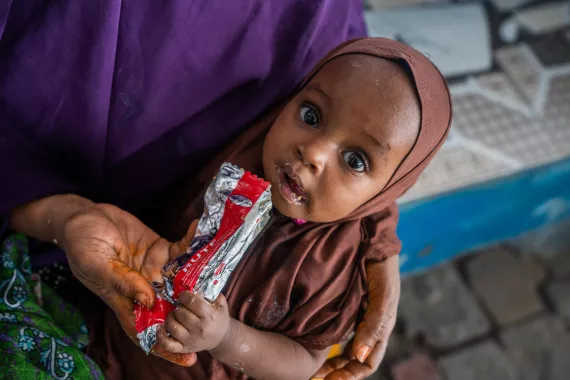 • Urges grants to make schools safer
• Urges grants to make schools safer
The United Nations Children’s Fund (UNICEF) has introduced a Child Nutrition Fund (CNF) as an alternative funding mechanism to tackle the high malnutrition rate in Nigeria.
Under the initiative, UNICEF is to provide counterpart funding for every amount provided by each of the state governments for malnutrition response.
Consequently, the UN agency has signed Memoranda of Understanding (MoUs) with the Borno, Adamawa, and Yobe (BAY) state governments to tackle the menace among children less than five years, pregnant and lactating women in the Northeastern part of the country through the provision of Ready-to-Use Therapeutic Food (RUTF).
According to the organisation, about 511,807 children in the region under age five suffer from Severe Acute Malnutrition (SAM) yearly, requiring urgent interventions to save their lives.
UNICEF Chief of Maiduguri Field Office, Dr Tushar Rane, who made the disclosure yesterday at the Child Malnutrition Media Dialogue organised by the global agency, in collaboration with the Child Rights Bureau of the Federal Ministry of Information and National Orientation, noted that the Borno State government had committed $100,000 counterpart funding to match UNICEF’s contribution in the same sum to the purse.
He lamented that children in the BAY states were battling escalating levels of malnutrition, and needed holistic response to address the situation, adding that about 1.5 million children under five years are screened every month in the three states for early identification and referral.
Rane revealed that about 322,000 children, aged 0-59 months, were admitted and treated in Outpatient and Inpatient care centres across the three states last month, explaining that this was the highest admission compared to all Julys in the last six years.
He observed that nutrition programmes are integrated within government health facilities, where there are 765 outpatient treatment programme (OTP) sites in the BAY states, providing treatment for children with SAM without medical complications, and 50 Stabilisation Centres (SCS) treating SAM with medical complications, as only 63 per cent of the 714 wards in the BAY states provide nutrition services.
ALSO, the global agency has urged all stakeholders to make schools safe, and government at all levels to make some amount of money available for public primary and secondary schools across the federation.
The call was part of findings and recommendations from the Minimum Standards for Safe Schools’ scorecards, a policy document to enhance safety around schools in Nigeria.
Speaking during a presentation at the state-level workshop for education stakeholders on Safe School Implementation, which was held at Government College, Ibadan, a UNICEF Education Specialist (Safe School), Believe Eke, lamented that many states are not doing enough in implementing the Safe School Policy.
He said UNICEF organised the workshop to enlighten, sensitise all stakeholders in the education sector on their roles to translate from the level of mere policy formulation to action and implementation of the Safe School Policy of the Federal Government.
His words: “What we are doing as UNICEF is to support safe schools in Nigeria, and like I said during the presentation, what we are doing is just moving from policy to action. We supported the government in developing a lot of policies, the minimum standard for a safe school, we have the national policy for safety security and violence-free schools.
“What we are saying is that those at the school level, the community level needs to understand their roles, the government needs to know what they need to do to be able to make school safer in Nigeria.”
Also speaking, another Education Specialist, Babagana Aminu, explained that the workshop was to support the Federal Government and Oyo State with the implementation of the Safe School Policy, with the mandate of ensuring that the basic rights of children are achieved and fulfilled.
In his remarks, the Commissioner for Education, Science, and Technology, Prof Abdul-waheed Adelabu, assured that the state would partner with relevant bodies and agencies to ensure that the schools are safe for studies.






